Business Structures and Director's Duties under Corporations Act
VerifiedAdded on 2023/06/11
|9
|2291
|488
Report
AI Summary
This report provides a legal analysis of business structures, including sole proprietorships, partnerships, and companies, outlining the merits and demerits of each. It recommends a sole trader structure for a small fashion business, considering capital requirements and liability. The report also details directors' duties under the Corporations Act 2001, covering care, fiduciary duty, conflict of interest disclosure, prevention of insolvent trading, and record-keeping. These duties ensure directors act diligently, honestly, and in the shareholders' best interests, promoting good corporate governance. Desklib offers students access to similar solved assignments and past papers for further study.

COMMERCIAL LAW
STUDENT ID:
[Pick the date]
STUDENT ID:
[Pick the date]
Paraphrase This Document
Need a fresh take? Get an instant paraphrase of this document with our AI Paraphraser
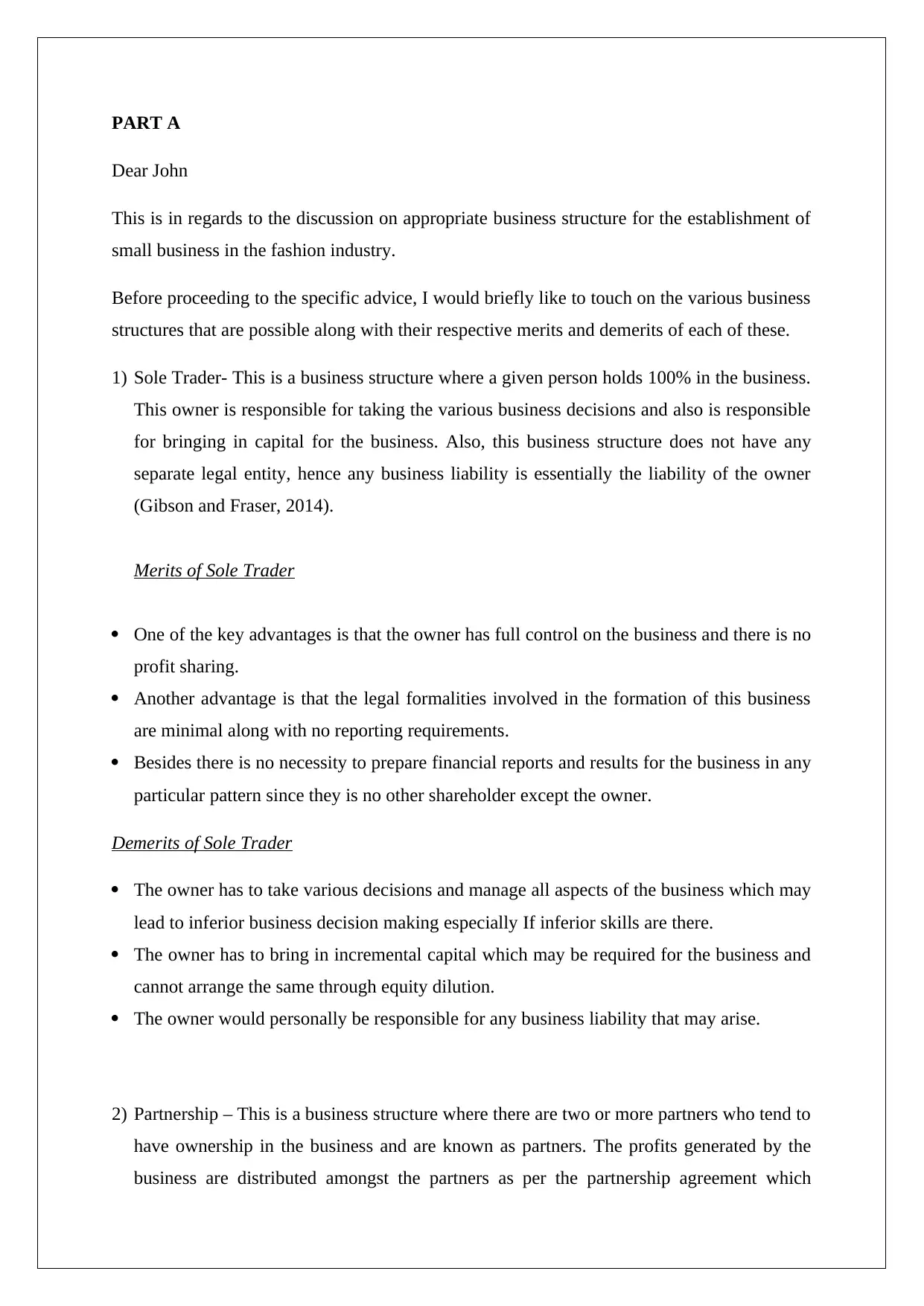
PART A
Dear John
This is in regards to the discussion on appropriate business structure for the establishment of
small business in the fashion industry.
Before proceeding to the specific advice, I would briefly like to touch on the various business
structures that are possible along with their respective merits and demerits of each of these.
1) Sole Trader- This is a business structure where a given person holds 100% in the business.
This owner is responsible for taking the various business decisions and also is responsible
for bringing in capital for the business. Also, this business structure does not have any
separate legal entity, hence any business liability is essentially the liability of the owner
(Gibson and Fraser, 2014).
Merits of Sole Trader
One of the key advantages is that the owner has full control on the business and there is no
profit sharing.
Another advantage is that the legal formalities involved in the formation of this business
are minimal along with no reporting requirements.
Besides there is no necessity to prepare financial reports and results for the business in any
particular pattern since they is no other shareholder except the owner.
Demerits of Sole Trader
The owner has to take various decisions and manage all aspects of the business which may
lead to inferior business decision making especially If inferior skills are there.
The owner has to bring in incremental capital which may be required for the business and
cannot arrange the same through equity dilution.
The owner would personally be responsible for any business liability that may arise.
2) Partnership – This is a business structure where there are two or more partners who tend to
have ownership in the business and are known as partners. The profits generated by the
business are distributed amongst the partners as per the partnership agreement which
Dear John
This is in regards to the discussion on appropriate business structure for the establishment of
small business in the fashion industry.
Before proceeding to the specific advice, I would briefly like to touch on the various business
structures that are possible along with their respective merits and demerits of each of these.
1) Sole Trader- This is a business structure where a given person holds 100% in the business.
This owner is responsible for taking the various business decisions and also is responsible
for bringing in capital for the business. Also, this business structure does not have any
separate legal entity, hence any business liability is essentially the liability of the owner
(Gibson and Fraser, 2014).
Merits of Sole Trader
One of the key advantages is that the owner has full control on the business and there is no
profit sharing.
Another advantage is that the legal formalities involved in the formation of this business
are minimal along with no reporting requirements.
Besides there is no necessity to prepare financial reports and results for the business in any
particular pattern since they is no other shareholder except the owner.
Demerits of Sole Trader
The owner has to take various decisions and manage all aspects of the business which may
lead to inferior business decision making especially If inferior skills are there.
The owner has to bring in incremental capital which may be required for the business and
cannot arrange the same through equity dilution.
The owner would personally be responsible for any business liability that may arise.
2) Partnership – This is a business structure where there are two or more partners who tend to
have ownership in the business and are known as partners. The profits generated by the
business are distributed amongst the partners as per the partnership agreement which
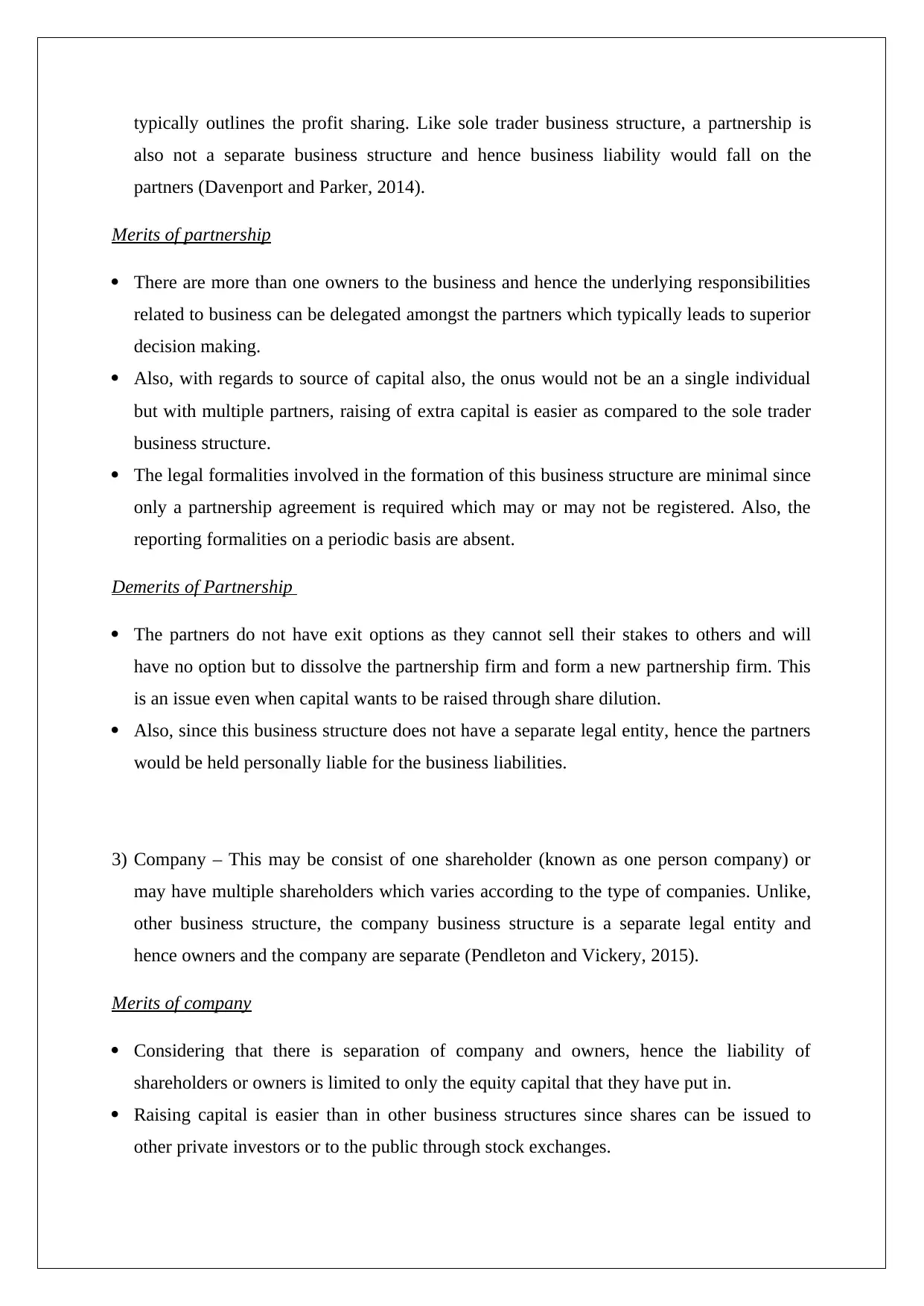
typically outlines the profit sharing. Like sole trader business structure, a partnership is
also not a separate business structure and hence business liability would fall on the
partners (Davenport and Parker, 2014).
Merits of partnership
There are more than one owners to the business and hence the underlying responsibilities
related to business can be delegated amongst the partners which typically leads to superior
decision making.
Also, with regards to source of capital also, the onus would not be an a single individual
but with multiple partners, raising of extra capital is easier as compared to the sole trader
business structure.
The legal formalities involved in the formation of this business structure are minimal since
only a partnership agreement is required which may or may not be registered. Also, the
reporting formalities on a periodic basis are absent.
Demerits of Partnership
The partners do not have exit options as they cannot sell their stakes to others and will
have no option but to dissolve the partnership firm and form a new partnership firm. This
is an issue even when capital wants to be raised through share dilution.
Also, since this business structure does not have a separate legal entity, hence the partners
would be held personally liable for the business liabilities.
3) Company – This may be consist of one shareholder (known as one person company) or
may have multiple shareholders which varies according to the type of companies. Unlike,
other business structure, the company business structure is a separate legal entity and
hence owners and the company are separate (Pendleton and Vickery, 2015).
Merits of company
Considering that there is separation of company and owners, hence the liability of
shareholders or owners is limited to only the equity capital that they have put in.
Raising capital is easier than in other business structures since shares can be issued to
other private investors or to the public through stock exchanges.
also not a separate business structure and hence business liability would fall on the
partners (Davenport and Parker, 2014).
Merits of partnership
There are more than one owners to the business and hence the underlying responsibilities
related to business can be delegated amongst the partners which typically leads to superior
decision making.
Also, with regards to source of capital also, the onus would not be an a single individual
but with multiple partners, raising of extra capital is easier as compared to the sole trader
business structure.
The legal formalities involved in the formation of this business structure are minimal since
only a partnership agreement is required which may or may not be registered. Also, the
reporting formalities on a periodic basis are absent.
Demerits of Partnership
The partners do not have exit options as they cannot sell their stakes to others and will
have no option but to dissolve the partnership firm and form a new partnership firm. This
is an issue even when capital wants to be raised through share dilution.
Also, since this business structure does not have a separate legal entity, hence the partners
would be held personally liable for the business liabilities.
3) Company – This may be consist of one shareholder (known as one person company) or
may have multiple shareholders which varies according to the type of companies. Unlike,
other business structure, the company business structure is a separate legal entity and
hence owners and the company are separate (Pendleton and Vickery, 2015).
Merits of company
Considering that there is separation of company and owners, hence the liability of
shareholders or owners is limited to only the equity capital that they have put in.
Raising capital is easier than in other business structures since shares can be issued to
other private investors or to the public through stock exchanges.
⊘ This is a preview!⊘
Do you want full access?
Subscribe today to unlock all pages.

Trusted by 1+ million students worldwide
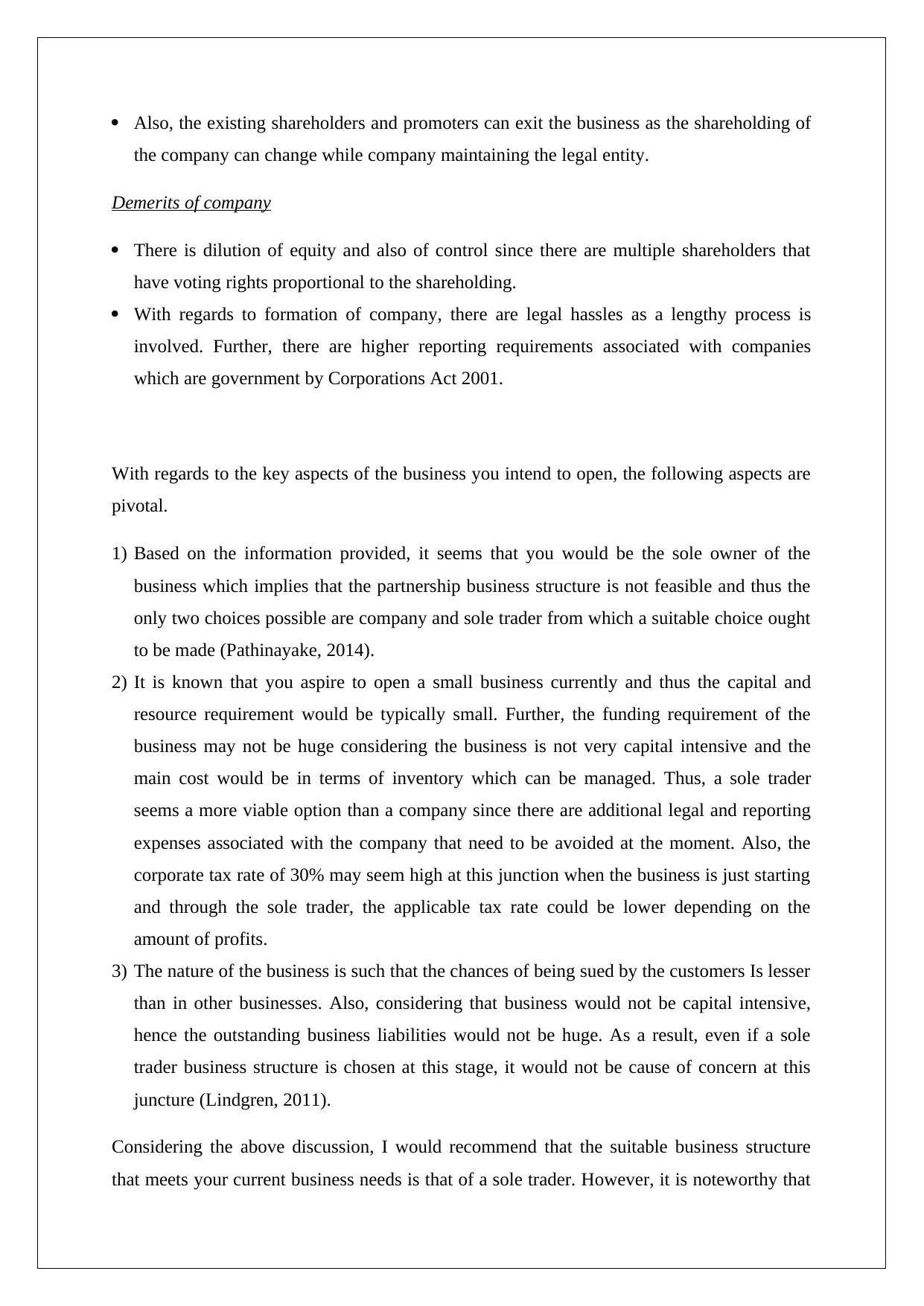
Also, the existing shareholders and promoters can exit the business as the shareholding of
the company can change while company maintaining the legal entity.
Demerits of company
There is dilution of equity and also of control since there are multiple shareholders that
have voting rights proportional to the shareholding.
With regards to formation of company, there are legal hassles as a lengthy process is
involved. Further, there are higher reporting requirements associated with companies
which are government by Corporations Act 2001.
With regards to the key aspects of the business you intend to open, the following aspects are
pivotal.
1) Based on the information provided, it seems that you would be the sole owner of the
business which implies that the partnership business structure is not feasible and thus the
only two choices possible are company and sole trader from which a suitable choice ought
to be made (Pathinayake, 2014).
2) It is known that you aspire to open a small business currently and thus the capital and
resource requirement would be typically small. Further, the funding requirement of the
business may not be huge considering the business is not very capital intensive and the
main cost would be in terms of inventory which can be managed. Thus, a sole trader
seems a more viable option than a company since there are additional legal and reporting
expenses associated with the company that need to be avoided at the moment. Also, the
corporate tax rate of 30% may seem high at this junction when the business is just starting
and through the sole trader, the applicable tax rate could be lower depending on the
amount of profits.
3) The nature of the business is such that the chances of being sued by the customers Is lesser
than in other businesses. Also, considering that business would not be capital intensive,
hence the outstanding business liabilities would not be huge. As a result, even if a sole
trader business structure is chosen at this stage, it would not be cause of concern at this
juncture (Lindgren, 2011).
Considering the above discussion, I would recommend that the suitable business structure
that meets your current business needs is that of a sole trader. However, it is noteworthy that
the company can change while company maintaining the legal entity.
Demerits of company
There is dilution of equity and also of control since there are multiple shareholders that
have voting rights proportional to the shareholding.
With regards to formation of company, there are legal hassles as a lengthy process is
involved. Further, there are higher reporting requirements associated with companies
which are government by Corporations Act 2001.
With regards to the key aspects of the business you intend to open, the following aspects are
pivotal.
1) Based on the information provided, it seems that you would be the sole owner of the
business which implies that the partnership business structure is not feasible and thus the
only two choices possible are company and sole trader from which a suitable choice ought
to be made (Pathinayake, 2014).
2) It is known that you aspire to open a small business currently and thus the capital and
resource requirement would be typically small. Further, the funding requirement of the
business may not be huge considering the business is not very capital intensive and the
main cost would be in terms of inventory which can be managed. Thus, a sole trader
seems a more viable option than a company since there are additional legal and reporting
expenses associated with the company that need to be avoided at the moment. Also, the
corporate tax rate of 30% may seem high at this junction when the business is just starting
and through the sole trader, the applicable tax rate could be lower depending on the
amount of profits.
3) The nature of the business is such that the chances of being sued by the customers Is lesser
than in other businesses. Also, considering that business would not be capital intensive,
hence the outstanding business liabilities would not be huge. As a result, even if a sole
trader business structure is chosen at this stage, it would not be cause of concern at this
juncture (Lindgren, 2011).
Considering the above discussion, I would recommend that the suitable business structure
that meets your current business needs is that of a sole trader. However, it is noteworthy that
Paraphrase This Document
Need a fresh take? Get an instant paraphrase of this document with our AI Paraphraser

going ahead when the business grows in size and capital needs, then a fresh review would be
required. In case of any further queries on this matter, please feel free to contact me.
Yours Sincerely
STUDENT NAME
PART B
required. In case of any further queries on this matter, please feel free to contact me.
Yours Sincerely
STUDENT NAME
PART B
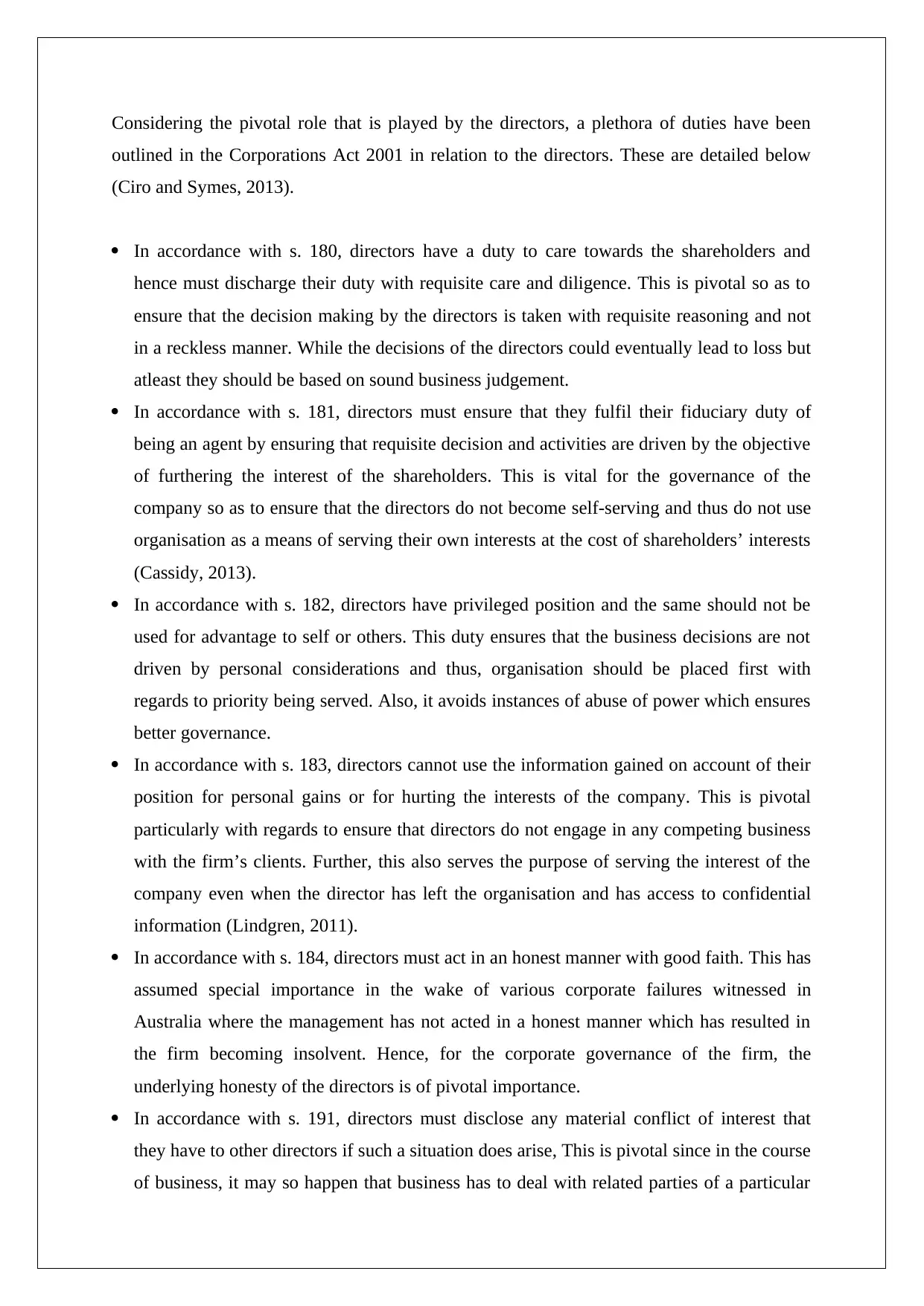
Considering the pivotal role that is played by the directors, a plethora of duties have been
outlined in the Corporations Act 2001 in relation to the directors. These are detailed below
(Ciro and Symes, 2013).
In accordance with s. 180, directors have a duty to care towards the shareholders and
hence must discharge their duty with requisite care and diligence. This is pivotal so as to
ensure that the decision making by the directors is taken with requisite reasoning and not
in a reckless manner. While the decisions of the directors could eventually lead to loss but
atleast they should be based on sound business judgement.
In accordance with s. 181, directors must ensure that they fulfil their fiduciary duty of
being an agent by ensuring that requisite decision and activities are driven by the objective
of furthering the interest of the shareholders. This is vital for the governance of the
company so as to ensure that the directors do not become self-serving and thus do not use
organisation as a means of serving their own interests at the cost of shareholders’ interests
(Cassidy, 2013).
In accordance with s. 182, directors have privileged position and the same should not be
used for advantage to self or others. This duty ensures that the business decisions are not
driven by personal considerations and thus, organisation should be placed first with
regards to priority being served. Also, it avoids instances of abuse of power which ensures
better governance.
In accordance with s. 183, directors cannot use the information gained on account of their
position for personal gains or for hurting the interests of the company. This is pivotal
particularly with regards to ensure that directors do not engage in any competing business
with the firm’s clients. Further, this also serves the purpose of serving the interest of the
company even when the director has left the organisation and has access to confidential
information (Lindgren, 2011).
In accordance with s. 184, directors must act in an honest manner with good faith. This has
assumed special importance in the wake of various corporate failures witnessed in
Australia where the management has not acted in a honest manner which has resulted in
the firm becoming insolvent. Hence, for the corporate governance of the firm, the
underlying honesty of the directors is of pivotal importance.
In accordance with s. 191, directors must disclose any material conflict of interest that
they have to other directors if such a situation does arise, This is pivotal since in the course
of business, it may so happen that business has to deal with related parties of a particular
outlined in the Corporations Act 2001 in relation to the directors. These are detailed below
(Ciro and Symes, 2013).
In accordance with s. 180, directors have a duty to care towards the shareholders and
hence must discharge their duty with requisite care and diligence. This is pivotal so as to
ensure that the decision making by the directors is taken with requisite reasoning and not
in a reckless manner. While the decisions of the directors could eventually lead to loss but
atleast they should be based on sound business judgement.
In accordance with s. 181, directors must ensure that they fulfil their fiduciary duty of
being an agent by ensuring that requisite decision and activities are driven by the objective
of furthering the interest of the shareholders. This is vital for the governance of the
company so as to ensure that the directors do not become self-serving and thus do not use
organisation as a means of serving their own interests at the cost of shareholders’ interests
(Cassidy, 2013).
In accordance with s. 182, directors have privileged position and the same should not be
used for advantage to self or others. This duty ensures that the business decisions are not
driven by personal considerations and thus, organisation should be placed first with
regards to priority being served. Also, it avoids instances of abuse of power which ensures
better governance.
In accordance with s. 183, directors cannot use the information gained on account of their
position for personal gains or for hurting the interests of the company. This is pivotal
particularly with regards to ensure that directors do not engage in any competing business
with the firm’s clients. Further, this also serves the purpose of serving the interest of the
company even when the director has left the organisation and has access to confidential
information (Lindgren, 2011).
In accordance with s. 184, directors must act in an honest manner with good faith. This has
assumed special importance in the wake of various corporate failures witnessed in
Australia where the management has not acted in a honest manner which has resulted in
the firm becoming insolvent. Hence, for the corporate governance of the firm, the
underlying honesty of the directors is of pivotal importance.
In accordance with s. 191, directors must disclose any material conflict of interest that
they have to other directors if such a situation does arise, This is pivotal since in the course
of business, it may so happen that business has to deal with related parties of a particular
⊘ This is a preview!⊘
Do you want full access?
Subscribe today to unlock all pages.

Trusted by 1+ million students worldwide
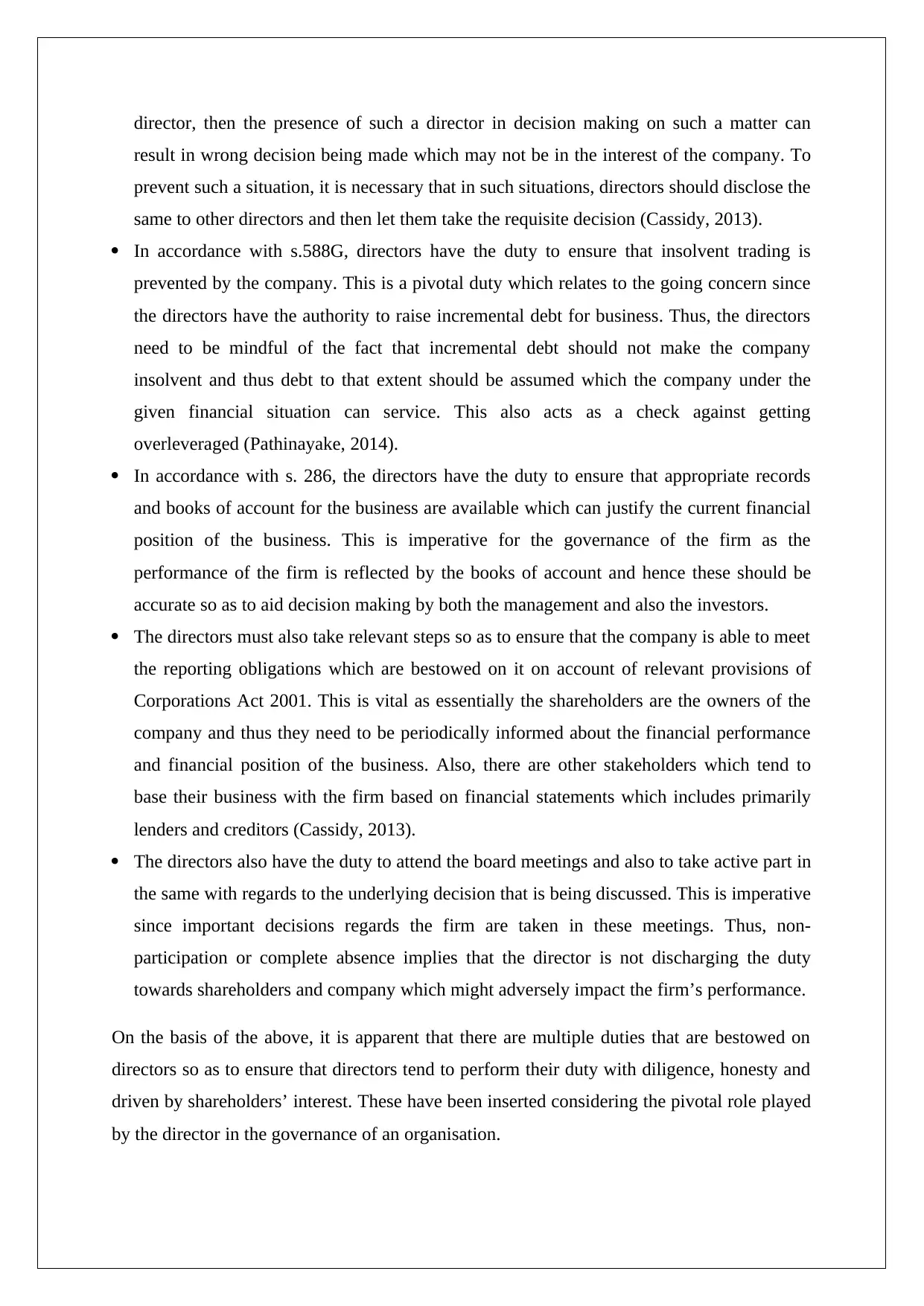
director, then the presence of such a director in decision making on such a matter can
result in wrong decision being made which may not be in the interest of the company. To
prevent such a situation, it is necessary that in such situations, directors should disclose the
same to other directors and then let them take the requisite decision (Cassidy, 2013).
In accordance with s.588G, directors have the duty to ensure that insolvent trading is
prevented by the company. This is a pivotal duty which relates to the going concern since
the directors have the authority to raise incremental debt for business. Thus, the directors
need to be mindful of the fact that incremental debt should not make the company
insolvent and thus debt to that extent should be assumed which the company under the
given financial situation can service. This also acts as a check against getting
overleveraged (Pathinayake, 2014).
In accordance with s. 286, the directors have the duty to ensure that appropriate records
and books of account for the business are available which can justify the current financial
position of the business. This is imperative for the governance of the firm as the
performance of the firm is reflected by the books of account and hence these should be
accurate so as to aid decision making by both the management and also the investors.
The directors must also take relevant steps so as to ensure that the company is able to meet
the reporting obligations which are bestowed on it on account of relevant provisions of
Corporations Act 2001. This is vital as essentially the shareholders are the owners of the
company and thus they need to be periodically informed about the financial performance
and financial position of the business. Also, there are other stakeholders which tend to
base their business with the firm based on financial statements which includes primarily
lenders and creditors (Cassidy, 2013).
The directors also have the duty to attend the board meetings and also to take active part in
the same with regards to the underlying decision that is being discussed. This is imperative
since important decisions regards the firm are taken in these meetings. Thus, non-
participation or complete absence implies that the director is not discharging the duty
towards shareholders and company which might adversely impact the firm’s performance.
On the basis of the above, it is apparent that there are multiple duties that are bestowed on
directors so as to ensure that directors tend to perform their duty with diligence, honesty and
driven by shareholders’ interest. These have been inserted considering the pivotal role played
by the director in the governance of an organisation.
result in wrong decision being made which may not be in the interest of the company. To
prevent such a situation, it is necessary that in such situations, directors should disclose the
same to other directors and then let them take the requisite decision (Cassidy, 2013).
In accordance with s.588G, directors have the duty to ensure that insolvent trading is
prevented by the company. This is a pivotal duty which relates to the going concern since
the directors have the authority to raise incremental debt for business. Thus, the directors
need to be mindful of the fact that incremental debt should not make the company
insolvent and thus debt to that extent should be assumed which the company under the
given financial situation can service. This also acts as a check against getting
overleveraged (Pathinayake, 2014).
In accordance with s. 286, the directors have the duty to ensure that appropriate records
and books of account for the business are available which can justify the current financial
position of the business. This is imperative for the governance of the firm as the
performance of the firm is reflected by the books of account and hence these should be
accurate so as to aid decision making by both the management and also the investors.
The directors must also take relevant steps so as to ensure that the company is able to meet
the reporting obligations which are bestowed on it on account of relevant provisions of
Corporations Act 2001. This is vital as essentially the shareholders are the owners of the
company and thus they need to be periodically informed about the financial performance
and financial position of the business. Also, there are other stakeholders which tend to
base their business with the firm based on financial statements which includes primarily
lenders and creditors (Cassidy, 2013).
The directors also have the duty to attend the board meetings and also to take active part in
the same with regards to the underlying decision that is being discussed. This is imperative
since important decisions regards the firm are taken in these meetings. Thus, non-
participation or complete absence implies that the director is not discharging the duty
towards shareholders and company which might adversely impact the firm’s performance.
On the basis of the above, it is apparent that there are multiple duties that are bestowed on
directors so as to ensure that directors tend to perform their duty with diligence, honesty and
driven by shareholders’ interest. These have been inserted considering the pivotal role played
by the director in the governance of an organisation.
Paraphrase This Document
Need a fresh take? Get an instant paraphrase of this document with our AI Paraphraser

References
Cassidy, J. (2013). Corporations Law Text and Essential Cases 4th ed. Sydney: Federation Press.
Cassidy, J. (2013). Corporations Law Text and Essential Cases 4th ed. Sydney: Federation Press.
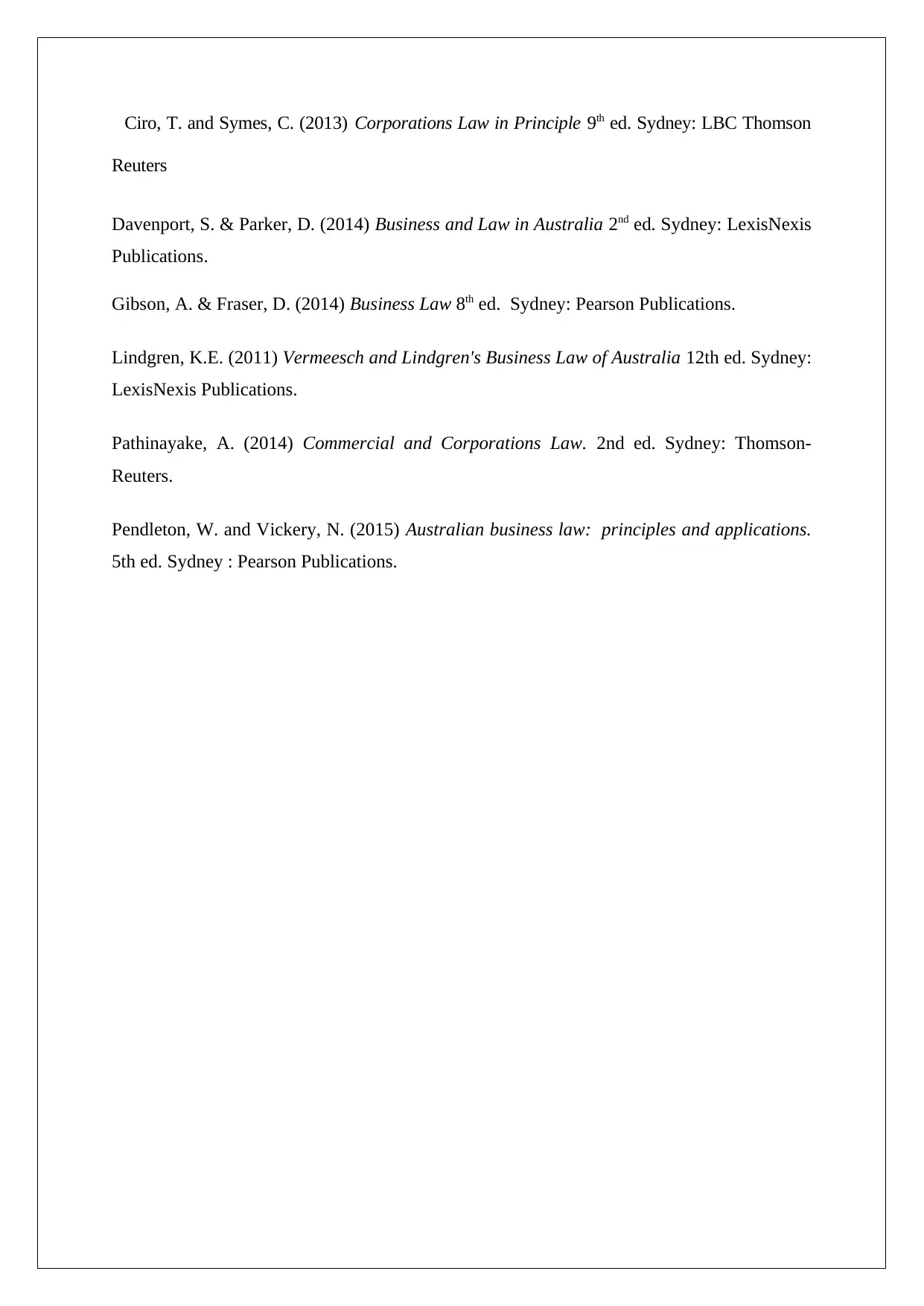
Ciro, T. and Symes, C. (2013) Corporations Law in Principle 9th ed. Sydney: LBC Thomson
Reuters
Davenport, S. & Parker, D. (2014) Business and Law in Australia 2nd ed. Sydney: LexisNexis
Publications.
Gibson, A. & Fraser, D. (2014) Business Law 8th ed. Sydney: Pearson Publications.
Lindgren, K.E. (2011) Vermeesch and Lindgren's Business Law of Australia 12th ed. Sydney:
LexisNexis Publications.
Pathinayake, A. (2014) Commercial and Corporations Law. 2nd ed. Sydney: Thomson-
Reuters.
Pendleton, W. and Vickery, N. (2015) Australian business law: principles and applications.
5th ed. Sydney : Pearson Publications.
Reuters
Davenport, S. & Parker, D. (2014) Business and Law in Australia 2nd ed. Sydney: LexisNexis
Publications.
Gibson, A. & Fraser, D. (2014) Business Law 8th ed. Sydney: Pearson Publications.
Lindgren, K.E. (2011) Vermeesch and Lindgren's Business Law of Australia 12th ed. Sydney:
LexisNexis Publications.
Pathinayake, A. (2014) Commercial and Corporations Law. 2nd ed. Sydney: Thomson-
Reuters.
Pendleton, W. and Vickery, N. (2015) Australian business law: principles and applications.
5th ed. Sydney : Pearson Publications.
⊘ This is a preview!⊘
Do you want full access?
Subscribe today to unlock all pages.

Trusted by 1+ million students worldwide
1 out of 9
Related Documents
Your All-in-One AI-Powered Toolkit for Academic Success.
+13062052269
info@desklib.com
Available 24*7 on WhatsApp / Email
![[object Object]](/_next/static/media/star-bottom.7253800d.svg)
Unlock your academic potential
Copyright © 2020–2026 A2Z Services. All Rights Reserved. Developed and managed by ZUCOL.




